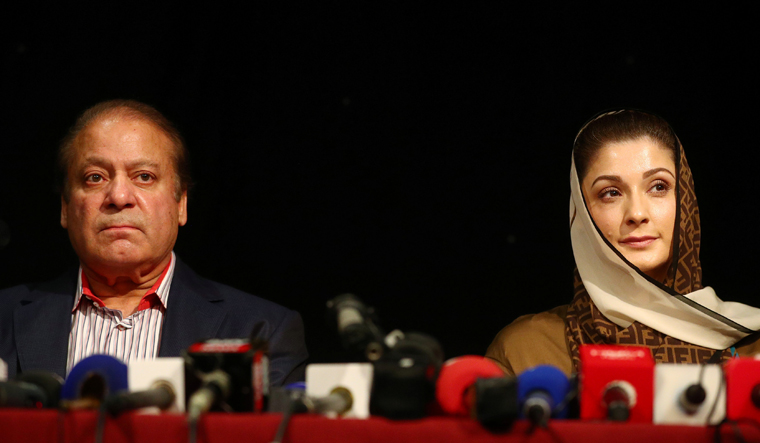“Dekho dekho kaunn aaya? Sher aaya. Sher aaya.” (See see who is coming? It’s the lion. It’s the lion) The PML(N)—its symbol is the lion—chant sums up the situation. The homecoming of Nawaz Sharif and his daughter Maryam on Friday, has ensured that the next week ahead of the election day on July 25 will be all about gathering support.
Forget the jalsas—all night affairs in Pakistan with songs and slogans, the next phase will be about mobilisation of people. From those who turn up at the airport to support Nawaz Sharif and his daughter Maryam, to those who choose to vote, it will all be about how many turn up and when.
Judging by the arrests of PML(N) workers on Thursday, the crowds might be thin. The dramatic arrest of Captain Safdar, Maryam’s husband who is implicated in the corruption case, for shouting slogans and addressing crowds in Rawalpindi, suggested what lay in store. “The crowds that came out for him have got some people worried,’’ said senior PML(N) leader Mushaid Ullah Khan. A loyalist, Khan will be by Sharif’s side when they land to face being arrested.
The stage is set for a confrontation and there is a bigger game afoot, beyond just the Sharifs and their saga. There is a seemingly deliberate attempt to intimidate and diminish popularity. Convoy of Bilawal Bhutto—who is leading a successful campaign—was stopped twice while he toured Punjab and Sindh. Moreover, a money laundering case has surfaced against Asif Zardari and his sister.
The results of the elections in Pakistan are perhaps slightly clearer. The process, however, got murkier with the indictment of the Sharifs in the Avenfield verdict. Imran Khan and the PTI seem to be ahead. The PML(N) is hoping that the return of Mian Sahib and Maryam will be enough to generate the kind of voting that is needed to keep them in the running.
Before the verdict, polls had 20 per cent people undecided. Post the announcement by the judge, it became clear which way the wind was blowing. So, can the PML(N) pull off a miracle with the odds—and the miltablishment—stacked against them?
“The atmosphere is surreal,” says Rana Banerji, a strategic expert who writes extensively on Pakistan. “It will now depend on how effective the PML(N) is in turning this into a mass-based protest. The history of mass-based movements is that they are difficult to engineer,” he said.
So far, the PML(N) has vowed to fight this head on. The next challenge would be converting the crowd support to votes. Typically, the voting percentage in Pakistani elections is not overwhelming and is around 45 per cent. In 2013, it went up to 55 per cent. “The results seem like a foregone conclusion. Imran Khan will be the biggest party. The religious parties will be more than amenable to support him,’’ said Banerji.
This is the first time that a powerful politician family in South Asia has been held accountable for corruption. It is historic and not totally unexpected. “It is a blow to Nawaz Sharif,” says Fawad Chaudhry, PTI spokesperson. “But it is one of the few instances, in India and Pakistan, of judgments against corruption. He can’t claim that this is conspiracy, because the origin was the Panama papers.”
But beyond the victory, there are larger questions that makes this less about justice—and corruption—and point to an agenda that might not be as idealistic. The 174 page judgment—which is full of typos and grammatical errors—is being challenged by the trio in Islamabad High Court.
This is not the first instance of zealousness by the judiciary. The banning of Nawaz by the Supreme Court—for not fulfilling a rather vague criteria, for life from parliament has been considered a signal that the judiciary may be complicit in an election result that is looking obvious.
The nomination papers of the former prime minister Shahid Khaqan Abbasi, were rejected by the election tribunal. It was only post an appeal to a high court that the decision was reversed.
PTI’s Choudhry was also victim to the same over scrutiny. “The decision of Shahid Khaqan Abbasi and mine was a mockery of justice,’’ says Choudhry. “It shows that if we don’t have a strong political government, the judiciary takes advantage. Judges become bigger than the law. This will be a challenge for any new government that comes in.” The raid and arrest of powerful bureaucrat and Nawaz’s principal secretary Fawad Hasan Fawad by the NAB last week for a housing scam suggests conspiracy.
For Nawaz, there is much more at stake than an election. The verdict has challenged his future and the future of his party. His coming back is to guarantee a future for Maryam.
Bright, articulate and eloquent, Maryam, has all the makings of a leader in Pakistan. She connects with people and she is an orator. Her announcement of their return to the media was a stark contrast to her uncle, Shahbaz Sharif, the chairman of the party, who looked shaken and unconvincing at the press conference post the Avenfield verdict. “PML(N) reject Accountability Court verdict against Nawaz Sharif, Maryam Nawaz and Captain Safdar. In the history this judgment would be written in black words,’’ he said.
Maryam's decision to face the charges head on—in the face of a seven-year imprisonment—has ensured that when Maryam steps off the plane, she will be a leader to contend with. And, Nawaz will be in for the fight of his life.


